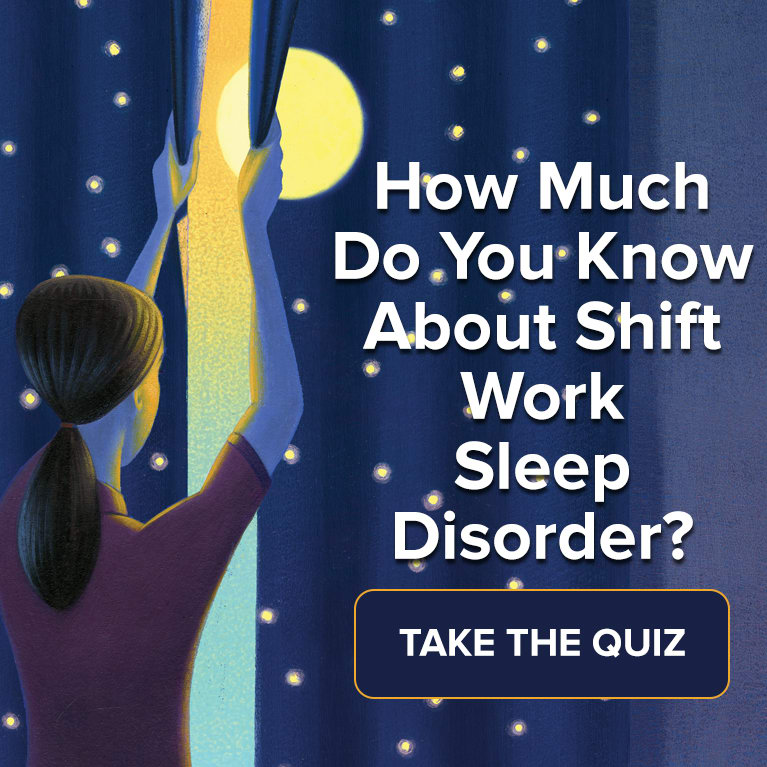How HR Can Help Sleepy Shift Workers
A good day's sleep for night-shift workers is essential to health, safety and productivity.
Introduction
Carolyn Schur’s friend Julian retired at age 60 after a 35-year career as a shift worker with a railway company. Now 75, Julian experiences nighttime sleep disruption as a result of decades of atypical work schedules, but he is otherwise healthy and active.

Schur, a fatigue management specialist based in Saskatoon, Saskatchewan, Canada, also had an uncle named Albert who worked nights and who, sadly, did not fare as well as Julian. A power engineer at a military base and later a maintenance worker at a sawmill, Albert persevered in demanding jobs despite recurrent heart problems.
A month after he retired at age 65, he was felled by a fatal heart attack in his front yard. No one can say whether Albert’s work schedule contributed to his untimely death, just as nobody can explain Julian’s relatively good health despite the stress of working and sleeping at odd hours for many years. But the men’s experiences serve as powerful reminders of the many challenges surrounding shift work and the need for HR professionals to manage it thoughtfully.
Roughly 30 million of the 150 million workers in the U.S., plus millions more abroad, work in shifts—at night or on split, rotating or varying schedules. Police officers, firefighters and hospital employees regularly work nights or at fluctuating times, as do workers in sales and services, agriculture, forestry, and mining, among other industries.
In addition, globalization has driven a trend toward 24/7 operations at many businesses. While nighttime staffing might seem like a smart way to boost organizational effectiveness in the always-on business world, shift work takes a toll on employees’ minds and bodies—which can in turn affect their productivity. Sleep-deprived workers tend to make more errors, take more sick leave and become moody, and they often suffer temporary or permanent health problems. That’s why it’s critical to help shift workers get the rest they need and keep as predictable a schedule as possible.
“The effect on employee performance is tremendous,” says Daniel A. Barone, an assistant professor of clinical neurology at Weill Cornell Medical College in New York City. His message to HR professionals in organizations with shift workers: “You’ve got to take care of people’s health.”
[SHRM members-only Express Request: Sleep-Deprived Workers]
Severe Consequences
There’s no telling how many HR professionals and line managers know of—and adhere to—best practices for scheduling and managing shift workers, but they may be few and far between. “It’s something that most HR people have no awareness of,” Schur says. “We treat people like they’re machines.”
In reality, the human body follows a natural rhythm tied to the sun. People are biologically programmed to sleep when it’s dark outside and to wake when it becomes light. When individuals sleep during the daytime or change their sleep times significantly, their built-in body clock is disrupted. They can experience a variety of symptoms. These are typically mild, such as grogginess at work. But if the disruption is dramatic and lasts long enough, it can lead to a condition called shift work sleep disorder, which is estimated to affect up to 10 percent of U.S. shift workers, according to the National Sleep Foundation. The most common symptoms are difficulty sleeping and excessive sleepiness. Headaches, trouble concentrating, lack of energy, irritability, depression and difficulty with personal relationships are also possible.
Night-shift workers generally get less sleep than the average adult. People who sleep during the day can be woken easily by noises, and sometimes family members don’t realize the impact of waking a shift worker frequently or at the wrong times. In addition, night-shift workers can feel less rested than others—even when they get close to eight hours of sleep. And they are often understandably reluctant to miss out on typical daytime activities. “Life happens,” Barone says. “You want to spend time with family and friends as regularly as possible.”
But skipping shut-eye comes at a price. Fatigue can degrade motor skills and judgment. Employees on regular night schedules are twice as likely as daytime workers to be injured on the job, according to research by Imelda Wong, an ORISE fellow at the Centers for Disease Control and Prevention/National Institute for Occupational Safety and Health. The risk is even greater for those on rotating shifts—people who, say, work nights for a while, then days, then evenings.
“When people are sleep-deprived, they take shortcuts,” says Jim Dillingham, a partner with consulting firm Shiftwork Solutions who is based near San Francisco.
The consequences can be severe. “There have been so many catastrophic examples when people working shift work don’t get enough sleep,” says National Sleep Foundation Environmental Scholar Natalie Dautovich, Ph.D., an assistant professor at Virginia Commonwealth University in Richmond, Va.
Sidebar: Supporting Shift Workers
Medical experts suggest the following ways to support employees who work odd hours:
| Provide schedules that are as predictable as business needs permit. |
| Limit the number of nights worked consecutively. |
| Avoid scheduling double shifts and overtime when possible. |
| Consider allowing long or frequent breaks, plus flextime and telecommuting. |
| Install work-area lighting that is optimal for night-shift workers. |
| Designate areas and times for employees to nap in the workplace. |
| Educate supervisors on how to identify chronically tired employees and when to intervene. |
| Provide health and wellness programs that are accessible at night and on weekends. |
| Encourage regular physical exams. |
| Develop programs to screen for fitness for duty as well as for sleep apnea and other sleep-related disorders. |
Offer transportation to and from remote worksites. |
Warning Signs
There are several direct expenditures related to shift work maladies, including health care expenses, workers’ compensation claims and pay for temporary workers who fill in for absent employees, Wong says. The largest indirect cost may be reduced productivity. One research paper reported an annual price tag of $54 million in lost productivity among four U.S. companies because of employees’ insomnia, insufficient sleep and sleep disturbances. However, the true cost to employers is difficult to calculate, in part because sleep issues are typically underreported.
That may be because sleep deprivation is not always apparent, even to those experiencing it. In fact, one common side effect of inadequate or poor-quality sleep is a reduced ability to detect impairment. “The more sleep-deprived we are, the less we recognize it,” Dautovich says.
Fortunately, there are steps HR and line managers can take to improve employees’ sleep and productivity. Businesses should review and adjust their scheduling practices before shift workers develop chronic fatigue or serious health issues.
[SHRM members-only resource: Discuss this article on SHRM Connect]
“Routinely monitor your workers, and look for anything out of the ordinary,” Barone advises.
Keep an eye out for warning signs, such as near-accidents, reduced work quality, lower production levels and absenteeism, Dillingham says.
Workers, too, can take actions to help their situations. Often, for example, employees recognize that they’re not cut out for working odd hours and leave the job. “If you’re not well-adapted to shift work, you’re not going to hang around for long,” Schur says.
Many who are affected adversely by night and variable shifts try to tough it out, however. “It’s part of the job” and “I’ll sleep when I’m dead” are comments heard all too often around the kitchen coffeepot in the wee hours. In addition to using caffeine and other stimulants to stay alert, some shift workers take melatonin, a natural hormone that helps regulate sleep/wake cycles, before going to bed. Others try light therapy. But sleep debt does not dissipate without stretches of solid Z’s.
In the long term, medical experts say, society needs to place more value on sleep, equating it in importance with nutrition and exercise. “Sleep is unique,” Dautovich says. “Our scientific understanding of it is relatively new. And how we perceive sleep has changed.” Whereas it was once viewed somewhat as a luxury or even a vice, it must be seen as a critical component of our functioning, she says.
Sidebar: Four Work-Related Disasters Tied to Lack of Sleep
 | The Three Mile Island partial nuclear meltdown. |
 | The Chernobyl disaster.
In the former Soviet Union in 1986, the Chernobyl nuclear power plant exploded, killing two workers and resulting in radiation poisoning of hundreds of others. The accident was caused by a flawed reactor design and by engineers who had been working for over 13 hours straight and failed to mitigate the problem.
|
 | The space shuttle Challenger explosion.
In 1986, shortly after takeoff, the spacecraft broke apart, claiming the lives of all seven astronauts aboard. A subsequent investigation showed that NASA flight managers had been working irregular hours and were short on sleep.
|
 | The Exxon Valdez oil spill.
The ship ran aground off the Alaskan coast in 1989 when the crew member who was steering the vessel fell asleep at the controls after working 18 consecutive hours.
|
'A Sensitive Topic'
Sleep is highly individualized—and highly personal. Employers can educate shift workers about the dangers of inadequate sleep, but employees might view the advice as an invasion of privacy. “It’s a sensitive topic,” Wong says. “This is people’s personal time outside of work.”
HR can get around this problem by identifying an “internal champion”—an employee who has taken HR’s advice and has seen his or her sleep-related symptoms improve, suggests Nitun Verma, co-founder and chief medical officer of San Francisco-area health provider PeerWell and a member of the American Academy of Sleep Medicine.
However, if a worker is not performing up to standards, intervention could be warranted. Options range from discussing available health and wellness resources to screening the worker for fitness for duty.
Some shift workers need more help coping with their schedules than others. And some schedules—such as those that change dramatically and frequently—can be more damaging than others. “Not all shift work is created equal,” Verma says.
Rapid rotations within a week result in the most lost sleep, Dautovich says: “People just don’t adapt to doing that.”
Yet there are many practical tips for shift workers looking to improve their sleep. A savvy employer can make a list of advice for workers, Verma says. Suggestions might include the following:
- Maintain a sleep diary to monitor habits.
- Avoid frequently swapping shifts if possible.
- Take a nap before going to work or during a night shift (with permission).
- Get plenty of sleep on days off.
- Place a “do not disturb” sign on your bedroom door and block all outside light sources.
- Wear sunglasses and avoid sunlight exposure as much as possible while driving home.
- Before beginning a new shift, change sleeping and waking hours so they correspond with those of the shift.
- Don’t ingest caffeine or exercise after a shift, since sleep can be delayed for hours after engaging in those behaviors.
- Avoid changing sleep and wake times on days off.
Accommodations
In many cases, shift workers can benefit from fairly simple accommodations. Lighting that helps night-shift workers feel more alert and productive can be a low-cost investment. In some situations, such as with miners who must travel long distances to and from worksites, offering company-provided transportation can boost productivity and satisfaction and help prevent fatigue-related motor vehicle accidents.
HR professionals can also involve employees in the process of devising their own work schedules. Managers and HR should survey and talk with employees and develop schedules that match employee preferences as closely as possible—while still meeting business needs and not compromising worker health and safety, says Bill Davis, vice president of operations at Stoneham, Mass.-based Circadian, a consultant to businesses with around-the-clock shifts. He notes that there are “literally hundreds” of schedule permutations possible at companies with 24/7 operations.
Managers and HR should survey and talk with employees and develop schedules that match their preferences as closely as possible.
Large organizations can make health, recreation, dining and other services available at all times, not just during the day. And it’s a good idea to limit mandatory daytime meetings, training and benefits enrollment sessions and to provide access to HR professionals and administrative staff at night and on weekends. “I encourage all HR people at least once a month to walk through a night shift,” Schur says. “Put a name to a face. Be accessible. Extend your hours of service.”
These arrangements can also help shift workers feel like they are equal in importance to their 9-to-5 colleagues. Schur notes that society has long referred to shift workers as “the graveyard shift” and “the third shift”—which might make some feel like second-class citizens.
Paying closer attention to the health of shift workers is in everyone’s interest, she says. Doing so can help ensure that more of them stay healthy and productive on the job and, even more important, that they enjoy a long and happy retirement.
Sidebar: Warning - Shift Work Can Be Hazardous to Your Health
According to studies, workers on variable schedules and those diagnosed with the medical condition shift work sleep disorder experience the following health issues more often than other employees:
| Shorter sleep duration and/or poorer sleep quality. |
| Elevated risk of breast cancer and increased risk of colorectal cancer. |
| Increased chance of premature childbirth, gastrointestinal disorders and mental health problems. |
| Higher risk of heart disease. |
Steve Bates is a freelance journalist in the Washington, D.C., area and a former writer and editor for SHRM.
Illustration by Jon Krause for HR Magazine.
Was this article useful? SHRM offers thousands of tools, templates and other exclusive member benefits, including compliance updates, sample policies, HR expert advice, education discounts, a growing online member community and much more. Join/Renew Now and let SHRM help you work smarter.


